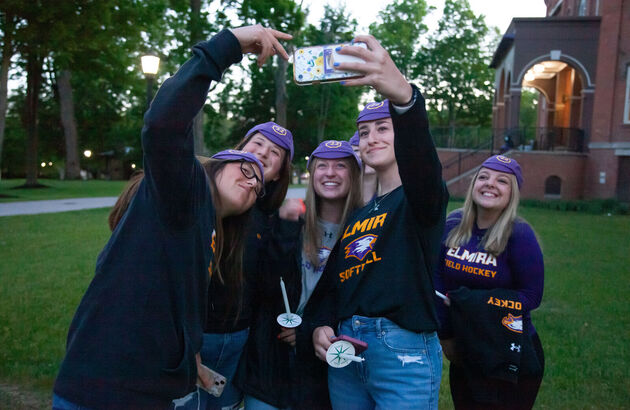News
Check out our news section to learn about all that's going on at Elmira College.
Welcome
About EC
Getting Started
Academic Resources
Apply to EC
Visit Campus
Tuition & Financial Aid
Campus Life
Outcomes & Careers
Athletics
Alumni

Grounded in the liberal arts and sciences, Elmira College provides a collaborative and supportive environment that enables students to become active learners, effective leaders, responsible community members, and globally engaged citizens.

The legacy of academic excellence at Elmira College runs deep with a heritage and culture that have been forward-thinking from day one, as the first college for women with a course study equivalent to men's.

At Elmira, you’ll have opportunities that shape your future, raise your sights and equip you with targeted tools and skills to succeed in the professional world. Join a community that’s close-knit, fun-loving, and just the right amount of quirky.

Elmira College makes a private education more affordable than you realize, with a number of ways to get the financial assistance you may need. Our financial aid office can guide you through options, including scholarships, grants, loans, and work-study programs.

Elmira College includes meeting students from around the world, participating in Elmira traditions, completing community service projects, and hopping into a pickup kickball game.

Elmira College provides you with a foundation for future success.

The home of the three-time NCAA National Champion Elmira College Soaring Eagles.

Elmira College alumni stay connected and engaged with the College long after they graduate.

Gifts to Elmira College ensure excellent academic and co-curricular opportunities for generations of EC students.

Check out our news section to learn about all that's going on at Elmira College.

With over 35 majors and minor areas of concentration, Elmira College lays the foundation for a diverse, cross discipline education, encouraging you to both specialize and explore.

The EC campus map can help you find your way around campus and find the best parking spot.

Looking for registration deadlines, spring break or when grades are due? Our academic calendar has all of the important events for this academic year.

Looking for a small, close-knit campus filled with incredible, hands-on learning opportunities? Our Admissions Office can help make Elmira College YOUR place.

Internal dashboard for EC news, events, resources, and more. Log-in required.
Info For








Please note: Updates to these policies may be made as needed. Announcements of any policy changes that take effect during the academic year will be distributed electronically. It is the responsibility of the user to remain informed of policy changes as a part of their employment duties.
Web pages are forms of publication and communication viewable by internal and external constituents. As such, web pages and their content must abide by College policies, copyright laws and other applicable local, state and federal regulations and laws relevant to web-based pages and web platforms.
The Office of Communications & Marketing, in partnership with the Department of Information Technology, will be responsible for the administrative and managerial oversight of all Elmira College web sites and web based platforms.
The Office of Communications & Marketing holds responsibility and authorization for reviewing and maintaining college web pages for accessibility, content, and clarity.
Oversight includes compliance, policy, training, guidelines, best practices, etc. and encompasses both current and future needs.
This partnership will oversee the appearance and operations of College websites, and will be responsible to review requests for new pages, new links, new content and new features to ensure institution-wide consistency and applicable compliance requirements including those outlined in Section 504 of the Rehabilitation Act of 1973.
“Website Stewards” will be designated for all offices, departments, centers, etc. who request or currently have official pages within an Elmira College web platform. These stewards, in conjunction with the web partnership established in this section, will hold responsibility for the content, links, and graphics of their appropriate page(s).
The stewards will be responsible for monitoring their sites for accuracy, compliance, and marketing as appropriate requesting change or modification as needed or required.
Section 504 of the Rehabilitation Act of 1973 guarantees certain rights to people with disabilities. In part, it states that no otherwise qualified individual with a disability in the United States, as defined in section 705(20) of this title, shall, solely by reason of her or his disability, be excluded from the participation in, be denied the benefits of, or be subjected to discrimination under any program or activity receiving federal financial assistance.
Elmira College is committed to ensuring equal access to information, programs, and activities through its web-based platforms and web pages for all constituencies.
The College recognizes the difference between official and unofficial (or personal) pages. Official pages represent the College and its programs.
No personal web page should create the impression that it is an official College web page, or give opinions or otherwise make statements on behalf of the College.
Sites that reference the College or those that link to the College must abide by the Elmira College Website Policy.
Pages by students, student groups, faculty and/or staff are considered to be unofficial pages, but these sites must still be consistent with the College’s mission and brand, while also complying with College policies, procedures, regulations and other applicable regulations, standards and laws.
All unofficial pages must carry the following disclaimer or a link to a page displaying the text:
Elmira College seeks to provide a high-quality and seamless web presence to all of our constituent communities, and so it is essential that design and content standards are applied consistently across all web pages and platforms.
Videos with or without audio must match and support the College’s overall strategic message and adhere to design, brand, and all other copyright laws.
Videos must meet the requirements of Section 504 of the Rehabilitation Act of 1973 ensuring we provide effective communications to those with disabilities.
Any Elmira College video posted online must abide by the Web Content Accessibility Guidelines 2.0 for Time-based Media. These requirements vary depending upon the video style and content. In regards to accessible video and audio, these principles should be kept in mind:
Any video provided must include captions and/or a text-based transcript. (ie. A course lecture)
Videos should be embedded or displayed in a player that can be accessed through a screen reader using keyboard commands.
Videos that include visual information should include audio descriptions of events.
Auto starting or looping audio and video is not permitted.
Transcripts for audio files must be provided.
Captions are mandated primarily for deaf and hard-of-hearing viewers, but captions benefit multiple audiences including:
Non-native English speakers
When vocabulary is unfamiliar
When the speaker is using an unfamiliar dialect
When audio is not clear or audio is not available. This last includes instances when audio quality is poor and instances when a person cannot listen to audio because of their environment.
Where compliance is not technically possible or may require extraordinary measures due to the nature or intent of the information resource, application or service, a request for exemption may be made.
Where compliance would result in a fundamental alteration of the information resource, application, or service, and not satisfy the original intent.
Where, in the case of information resources, applications, and services that are procured through third party vendors or contractors, no alternative accessible products are available from other third party vendors or contractors.
The College reserves the right to deny network access to groups or individuals who ignore the aforementioned guidelines or violate College policies.
The College also reserves the right to remove pages from the College network that have become outdated, contain an excessive number of invalid links to other sites, compromise system integrity, are non-compliant, or cause a negative impact on server or network performance.
Web pages supported by the College network may not be used for non-College commercial purposes.
Failure to comply with these guidelines and other college related policies would make an individual subject to disciplinary action, as described in the Student, Employee, or Faculty Handbook, and may result in a loss of College computing privileges.

